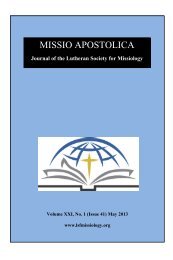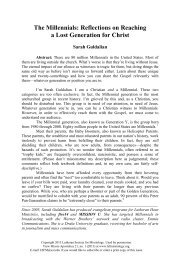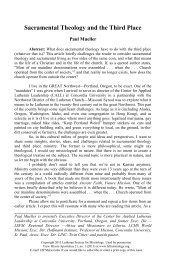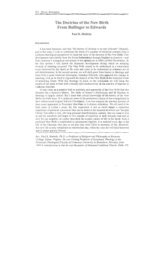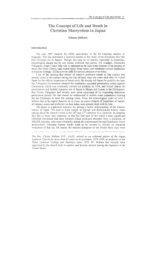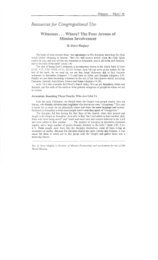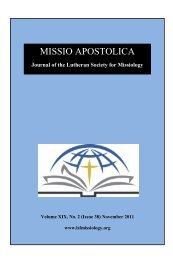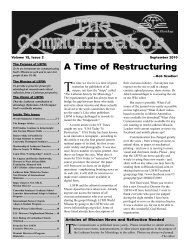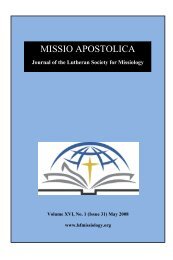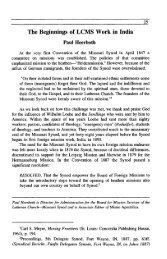Reflections of a New Missionary - Lutheran Society for Missiology
Reflections of a New Missionary - Lutheran Society for Missiology
Reflections of a New Missionary - Lutheran Society for Missiology
Create successful ePaper yourself
Turn your PDF publications into a flip-book with our unique Google optimized e-Paper software.
What's <strong>Lutheran</strong> About Worship:<br />
Theology From the Inside Out<br />
Jacob A. 0. Preus<br />
Introduction<br />
W-hat is <strong>Lutheran</strong> about worship Immediately two prior questions arise: What is<br />
<strong>Lutheran</strong> What is worship That inevitably leads to a more fundamental inquiry: What<br />
is the relationship between theory and practice And how do we resolve the problem <strong>of</strong><br />
the relationship between the theory (theology) and practice (worship)<br />
There is an understandable tendency to dichotomize theology and practice as though<br />
distinctively separable, when in reality they cannot meaningfully be abstracted from each<br />
other. Practice, either consciously or unconsciously, will be in<strong>for</strong>med by theology <strong>of</strong><br />
some sort. It will be <strong>Lutheran</strong> or not, but it won't just be nothing. Theory and practice are<br />
inseparable.<br />
The second problem is that some fail to see the difference between the theology <strong>of</strong><br />
worship and its practice, that is, the difference between what worship is and how it<br />
should be done in the human, historical, and cultural contexts within which God's people<br />
have worshiped throughout the history <strong>of</strong> the church. Theology <strong>for</strong> us is an absolute, but<br />
practice is not. Our practice, while guided and in<strong>for</strong>med by our theology, will change<br />
from time to time, and from place to place, as indeed it must. Theory and practice, while<br />
inseparably connected, are yet clearly distinct.<br />
So, let's think this through. As a seminary student, I was taught that worship had two<br />
perspectives: sacramental and sacrificial. The sacramental elements are primary: those<br />
that God does (through preaching, baptism, the Lord's Supper, absolution, etc.); the<br />
sacrificial elements are the secondary, i.e., what we do (in praise, witness, confession,<br />
prayer, etc.). The scheme is familiar. The question might be asked, "Is there a better<br />
way"<br />
To begin at the beginning with what gives rise to worship and makes worship what it<br />
is, keep in mind that since theory determines the practice, we do well to start at that point<br />
and proceed to the questions <strong>of</strong> how it should function and how to organize these<br />
functions. We begin at the center.<br />
Dr. J.A.O. Preus, President <strong>of</strong> Concordia University, Iwine, presented this paper to the<br />
Mission Planters Institute at Irvine on July 22, 2000.




